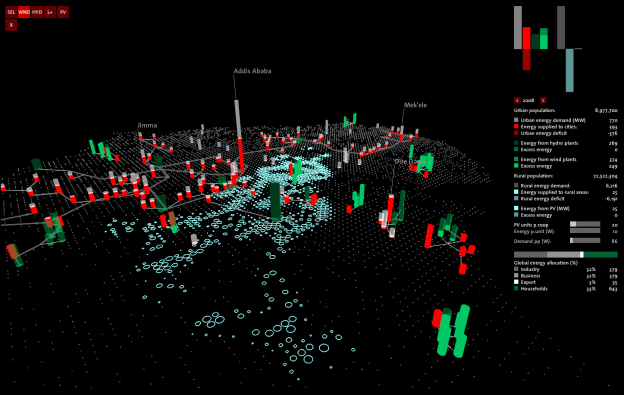The energy scenario planning tool, developed by Eva Friedrich, has been presented at the ADDIS 2050 conference in Addis Ababa on October 9th and 10th 2012. The basic concept of the work is to create an intuitive and playful tool that allows for collaborative, interactive exploration of possible energy supply and consumption scenarios in Ethiopia. The users can move in time and compare different approaches to energy development in their effect: centralized hydro power, less-centralized wind power with local support, and completely decentralized solar power for rural, disconnected areas – thereby obtaining a better understanding of the effects of mid- to long-term energy planning.
The tool’s interface is built in a minimal style in order to keep the focus on the relevant points. It supports multi-touch surfaces, and borrows concepts from game engines, e.g. physics based animations for connecting networks.
The conference ADDIS 2050 — an alternative pathway into Ethiopia’s future — was held on October 9th and 10th 2012 at the campus of the Ethiopian Institute of Architecture, Building Construction and City Development EiABC in Addis Ababa. Addis Ababa belongs to the fastest growing urban centers in the world. Migration from the rural areas as well as massive redevelopment strategies of the City Government put the African capital under enormous pressure. Infrastructural deficiencies, water and energy shortages, environmental hazards and mobility challenges question the current modus operandi in place.
The Green Forum Ethiopia under the leadership of Heinrich Boell Foundation in Addis Ababa commissioned the Chair of Architecture and Construction Dirk E. Hebel at FCL Singapore in collaboration with the Ethiopian Institute of Architecture, Building Construction and City Development EiABC to invent an alternative “green” scenario for the city of Addis Ababa in the year 2050. The conference concentrated on the issues of Energy, Mobility, Cultural and Social Space, Housing and Information. The event was visited by more than 500 people and arose immense interest from the media as well as the City Administration. As guest of honor, the Swiss Ambassador H.E. Dominik Langenbacher attended the conference as well as delegates from several federal ministries and the UN-Habitat. In the meantime, the Department of Masterplanning and Vision of the City Adeministration invited the speakers to present the work in their offices.
Team FCL Singapore: Dirk Hebel, Felix Heisel, Marta Wisniewska, Alireza Javadian, Gerhard Schmitt, Stephen Cairns, Remo Burkhard, Eva-Maria Friedrich, Matthias Berger, Stefan Mueller Arisona, Ludger Hovestadt, Jorge Orozco, Alex Erath, Max Hirsh, Sonja Berthold, Ying Zhou, Edda Ostertag, Naomi Hanakata, Lindsey Ann Sawyer, Cheryl Song, Noor Faizah Binte Othman, Kevin Lim, Amanda Tan
Team EiABC: Joachim Dieter, Bisrat Kifle, Addis alem Fekele, Tewedaj Eshetu, Yosef Teferri, Eyob Wedesu
Team Green Forum/Heinrich Boell Foundation: Patrick Berg, Ayele Kebede, Jonas
(Description from above YouTube site)
Software Design and Development: Eva Friedrich
Energy Modelling: Matthias Berger,
Principal Investigators: Gerhard Schmitt & Stefan Müller Arisona
Institution: Future Cities Laboratory, ETH Zürich
Period: August / September 2012

